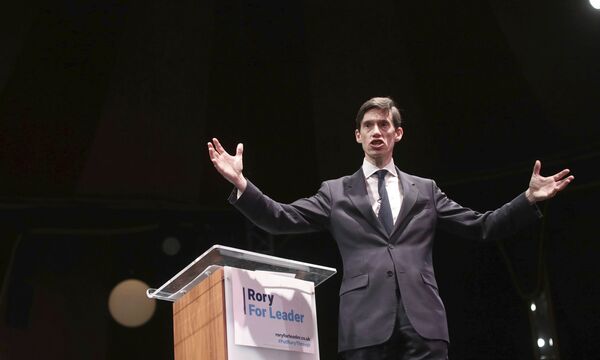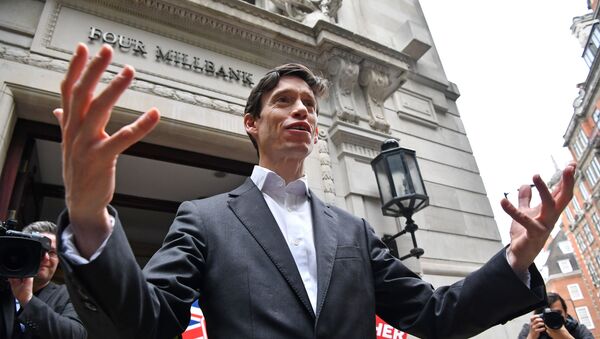The evening of 18th June saw Conservative MPs vote in the second round of their party’s leadership election. In the first, International Development Secretary Rory Stewart received 19 votes - lower than Mike Hancock, who dropped out of the race - but clung on, and in the second his total jumped to 34.
Ever since, he’s become something of a mainstream darling, news outlets providing him with more coverage - and interview opportunities - than his opponents Sajid David, Michael Gove and Jeremy Hunt. Boris Johnson has simply refused to conduct any media appearances.
Risen Without Trace
It seems Stewart was destined for power from birth.
Born January 1973 in Hong Kong - then still a British colony - to Brian Stewart and Sally Elizabeth Acland Nugent, a pair of aristocrats with their own ‘family seat’, the grand Broich House in Perth and Kinross, built in 1770, his family would trot the globe throughout his childhood.
This jet-setting resulted from his father’s employment at MI6, Britain’s foreign intelligence service, which he joined following Malaysian independence in 1957. At the time of his son’s birth, he’d been head of the agency’s station in Hong Kong and political adviser to the General, responsible for intelligence operations in the Far East, for a year.
A year later, he was invited back to the UK and offered the post of Director of Technical Services, one of MI6’s top three posts, and served as the de facto deputy to his friend and mentor Sir Maurice Oldfield, agency director.
Brian Stewart was a spy and British Patriot, unlike his Son @RoryStewartUK who decided to become a traitor. pic.twitter.com/6SDEkcufh9
— Biker Bob's Brexit; We Live the Big Lie (@bobsdirtypiggy) June 11, 2019
He’d aspired to succeed Oldfield, but the post was instead awarded to Dick Franks, leading to his retirement. Brian being passed over stemmed from his colleagues’ dislike of him - upon hearing he was in the running for the post, many senior MI6 officers threatened to resign en-masse if he got the job.
Rory would be educated at the elite Dragon School and Eton College - as a teenager, he joined the then-radical Labour Party. It’s unclear whether this was a bout of youthful rebellion or otherwise, for during his gap year - aged 18 - he was commissioned in the British army’s elite and secretive Black Watch infantry battalion for five months as second lieutenant.
He would then attend Oxford University, studying Modern History for one year before switching to Philosophy, Politics and Economics, the favoured degree of so many Prime Ministers and elite figures (The Guardian has dubbed it “the degree which runs Britain”). Adding to his regal credentials, while a student he was a private tutor to Princes William and Harry one summer.
After graduating, Stewart joined the Foreign Office, serving in the British embassy in Indonesia 1997 - 1999. At just 26, he became UK representative to Montenegro in the wake of the Kosovo War.
Many have suggested Stewart was an MI6 operative during this period. It’s an allegation Stewart has strenuously denied on several occasions, although he’s conceded his career progression and his father's professional history could "give the appearance" he worked for agency, and acknowledged he couldn't admit to being a spy even if he had been.
Craig Murray, UK ambassador to Uzbekistan 2002 - 2004, tells a very different story.
“Crusading neo-Conservative Rory Stewart…is constantly referred to as a former diplomat. Stewart was an MI6 officer and not a member of the FCO [Foreign & Commonwealth Office]. [In 2006] I received a message from the FCO asking me not to mention this as Stewart was still very active for MI6 in Afghanistan and his life could have been endangered. I agreed, and even removed a reference from my blog. However now…I see no reason to conceal the truth. It is necessary to reveal this so people can correctly evaluate his political pronouncements on Iraq and Afghanistan, and his motives in making them,” he wrote in 2009.
‘Get On With It’
If Murray’s claims are true, there are serious questions to be asked about his spell as Deputy Governorate Co-Ordinator in Iraq 2003 - 2004, and indeed his ascension to the House of Commons.
Stewart is said to have long-dreamed of becoming an MP, and when in the aftermath of the 2009 parliamentary expenses scandal then-Tory leader David Cameron decided to "reopen the Conservative candidates' list to anybody who wants to apply", he quickly ran for selection in the Bracknell constituency - despite losing, he was selected as the party candidate for the safe seat of Penrith and the Border. He won with a majority of 11,241, which he almost doubled in 2015 to to 19,894, and was also safely re-elected n the 2017 general election, he received 60.4% of the vote.

While in parliament, he’s almost always voted in line with party - notable is his strong and unvarying support for the use of UK military forces in combat operations overseas, and against investigations into the Iraq War. He has also typically trodden a Euroskeptic line, voting against greater EU integration, and since the Brexit referendum has opposed the right to remain for EU nationals already in living in the UK.
However, Stewart has cemented himself as something of a maverick on the campaign trail, breaking with party policy in many key areas. For one, he’s the only candidate to suggest the Brexit deal secured by outgoing Prime Minister Theresa May could be viable, and a no-deal Brexit would be “catastrophic”, “undeliverable” and “unnecessary”.
Nonetheless, while Brexit has dominated other candidates’ campaigning and debate performances, Stewart claims there’s “much more to do”, and has floated policy proposals on a variety of different issues.
“We need a hundred new policies addressing everything from the biggest infrastructure projects to the daily injustices of life. We should aim to build two million homes in the next five years, transform our broadband, and our impact on the environment, but we should also abolish charges in hospital car parks. If more than 20,000 people are dying prematurely from polluting fumes, or pollution is causing toddlers' lungs to be under-developed, or we aren't adequately supervising offenders in the community, then we shouldn’t be trying to hide the problem, we should be solving it. If the treasury or a civil servant is arguing it isn't a priority to install x-ray scanners or sniffer dogs to search prisoners for phones and drugs, we need to challenge them and get it done. If men who loot pension pots and don’t pay British taxes are getting knighthoods, then we need to protect those pensions, and take away that knighthood. And if we are facing a climate emergency threatening our planet then we need not just to talk about it, but get on with it,” he writes in his campaign manifesto.
Moreover, Stewart has fused traditional on-the-ground campaigning with the power of social media, regularly posting videos of himself interacting with voters and broadcasting their concerns to c. 181,000 followers. Such campaigning has made his rivals, who’ve barely troubled with Twitter, look rather cautious and old-fashioned, and there are suggestions other candidates are collectively rounding their fire on him as they find Stewart so threatening.
They may have good reason to worry - a YouGov survey which gauged opinions on who “performed best” in the 18th June leadership candidate debate found that while Conservative voters overwhelmingly thought Johnson came out on top, overall 35 percent of viewers believed Stewart had, compared to 21 percent for Johnson, 14 percent for Jeremy Hunt, nine percent for Gove and five percent for Javid. The figure rose to 57 percent for Stewart among ‘remainers’, while Johnson scored just seven percent with the same demographic.
Very reassuring to see whatever the media is reporting and despite the format that the public at least felt I won the debate last night. @YouGov poll of 2534 people who watched it. pic.twitter.com/Qw5v7ajLQj
— Rory Stewart (@RoryStewartUK) June 19, 2019
Clearly, Johnson goes down a treat with party die-hards, but the Conservatives will need support of the wider public - floating voters, undecideds and more - to win the next General Election, whenever it’s held. Ultimately, whether Stewart can triumph may be a matter of whether MPs, and party members, put their wider political interest above achieving Brexit, and affection for its most prominent and controversial advocate.
Still, even if he doesn’t win this time round, it’s almost inconceivable Stewart won’t run again in future - if he does, perhaps he’ll offer greater clarity over what he was and wasn’t actually doing while ostensibly employed by the Foreign Office.



